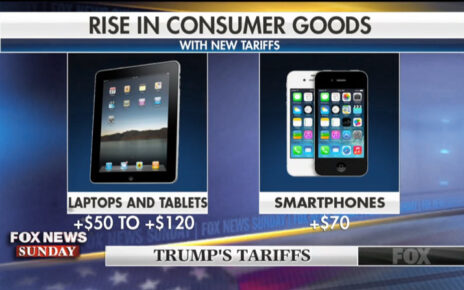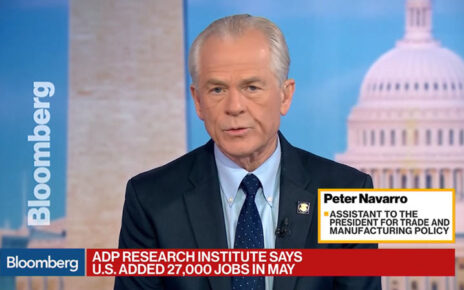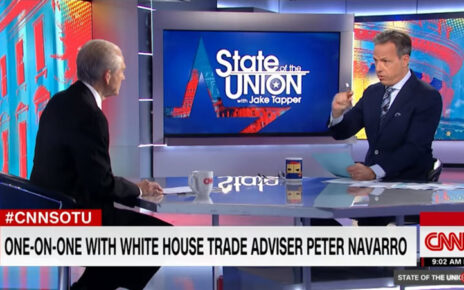A transcript from “Fox News Sunday,” March 4, 2018
Joining us now, one of the architects of that controversial plan, White House trade adviser Peter Navarro.
Mr. Navarro, welcome to “Fox News Sunday.”
PETER NAVARRO, WHITE HOUSE TRADE ADVISER: Mr. Wallace, good to be here, my friend.
WALLACE: The blowback to the new tariff policy is intense, especially from conservatives who are — here are two leading Republican senators.
(BEGIN VIDEO CLIP)
SEN. ORRIN HATCH, R-UTAH: I hope the president doesn’t really do this because if he dos at the president doesn’t really do this because if he does it’s going to — it’s just going to be a huge tax on American citizens.
SEN. BEN SASSE, R-NEBRASKA: If you own a steel mill, today was great for you. If you consume steel, and every American family at the store tonight has something that has different metals in it, today is a bad day for you.
(END VIDEO CLIP)
WALLACE: Are Sasse and Hatch who is the chair of the Senate Finance Committee, are they wrong?
NAVARRO: Of course, they are wrong.
In terms of the Republican Party, let’s remember this: Donald Trump ran against 16 Republicans. None of those Republicans supported Donald Trump’s positions on trade. He beat every one of them.
And then Donald Trump went on to the Democratic opponent who didn’t support his positions on trade and he beat them, too.
What Donald Trump wants to do is fulfill his campaign promises to the American people and defend American workers. And when we here about huge effects here, let’s do some of the numbers here. I mean, first of all, the reason why the president is doing this because if he doesn’t do this, we were will lose our aluminum steel, aluminum industry very quickly and our steel industry very quickly thereafter.
If you look at the aluminum industry, for example, we are down now to less than 10 percent to fulfilling our demand. With lost six smelters since 2013. We are down to five smelters, only two of them are fully operational. We are operating at a 43 percent capacity factor and only one of those smelters makes the high-purity aluminum we need for our defense —
(CROSSTALK)
WALLACE: Let’s unpack some of this. One of the things that both of those senators raised was that this is going to raise prices for American consumers, and the fact is it will. Commerce Secretary Ross estimates that if you take the imported steel that goes into an American built car, it will increase the price of that car $175.
An analyst at the Cato Institute tweeted this. So, a new $175 per vehicle tax times 17 million vehicles sold in the USA in 2017 equals almost $3 billion in new annual consumer taxes, just for steel and autos.
Overall, if I may, sir, if you talk about not just cars but all the products that use imported steel or imported aluminum, we are talking about a tax on American consumers in the billions of dollars.
NAVARRO: I like Secretary Ross’ map of a whole lot better. Let’s do it for aluminum. If you look at a 10 percent tariff on aluminum, a six-pack of beer or Coke, that’s a cent and a half. If you look at the other end of the spectrum, Boeing 777, it’s one of the best airliners ever made, it’s $330 million aircraft. We are talking but it increased and caused at the worst of $25,000.
So, when you’re talking about these massive costs or whatever is in fact, it’s not. There are no downstream price effects on our industries that are significant. What we are doing here, and let’s be very clear about the mission —
WALLACE: Wait a minute, even — if it’s $175 a car and there are 17,000 cars — 17 million cars, that is a $3 billion tax.
NAVARRO: I guess we would disagree about how to do that math here, $175 on a $30,000 car is less, a small fraction of 1 percent.
WALLACE: You add it up —
NAVARRO: Now, to get that — well, you can do that math —
(CROSSTALK)
WALLACE: Wait a minute, sir. If you add it, we are talking billions of dollars in added cost.
NAVARRO: Let’s see, last time I checked, we had an $18 trillion economy. It’s second (INAUDIBLE) small, there’s not enough zeros to get —
(CROSSTALK)
WALLACE: I mean, I know you are a good economist but the fact is we are talking in billions of dollars, correct?
NAVARRO: On a $19 trillion economy. Here —
WALLACE: But you do agree, it’s billions of dollars increase in cost?
NAVARRO: What I agree is that the downstream effects of steel and aluminum tariffs are insignificant in the mission here is to preserve our steel and aluminum industries for national security and economic security —
(CROSSTALK)
WALLACE: All right. No, I want to pick up on exactly that point because the president is imposing these new tariffs under Section 232 of the Trade Expansion Act which says that all of this imported steel and all of this imported aluminum, it threatens our national security.
I want to ask you about that.
Here are the countries that we import steel from. Canada is number one with 16 percent of the market. South Korea is number three. Russia is number five. And China is way down at number 11 with only 2 percent of our national steel imports.
Question, how can Canadian imports be a threat to our national security when, for the last quarter-century under law, Canadian imports are — the Canadian industrial base is considered part of our defense, the American defense industrial base?
NAVARRO: So, let’s tackle this in two ways. First of all, let’s talk about the 232. When 232 investigation, its national security and economic security broadly defined. In this country, agnostic, it doesn’t matter who is sending us this product, the fact is if we keep receiving at the way we are, we’re not going to have an aluminum industry, we’re not going to have the steel industry.
Our aluminum industry, make no mistake, that thing is on life support. That will be gone in a year or two if the president doesn’t take the courageous actions he’s proposed. So —
WALLACE: So, let me ask — let me ask you this, will the president —
NAVARRO: Hang on —
(CROSSTALK)
WALLACE: No, but let me ask you this, will the president —
NAVARRO: You promised, you asked me not to filibuster. I would ask you to do the same thing.
(CROSSTALK)
WALLACE: I’m asking a question. Will the president exempt allies like Canada and Europe?
NAVARRO: On Thursday, which was a great meeting with the CEOs, there was uniform consensus that what the president needed to do was tariffs, not quotas and it needed to be across-the-board. That was the president’s announcement, that’s the direction it’s heading. So, my expectation is that the direction it’s heading.
WALLACE: So, in answer to my direct question, will he exempt Canada? Will he exempt the European Union?
NAVARRO: That’s not his decision. And so —
WALLACE: Well, I mean, it is his decision.
NAVARRO: Look, you have to understand —
WALLACE: You are saying he’s not going to do it?
NAVARRO: You have to understand, Chris: as soon as he starts exempting countries, he has to raise the tariff on everybody else. As soon as he exempts one country, his phone starts ringing from heads of state of other countries.
WALLACE: So, just to make it clear —
NAVARRO: They say, why not me?
WALLACE: It’s a global imposition.
NAVARRO: That’s an answer.
WALLACE: Global imposition?
NAVARRO: Yes. Yes. And as it should be, because let’s think about what the mission is here, OK?
The mission is to defend our steel and aluminum industries so that they survive it and as the president said clearly and correctly, we can’t have a country without steel and aluminum industry.
WALLACE: OK —
NAVARRO: Would you grant me this that we are down now to less than 10 percent of meeting production and we’re down to five smelters?
WALLACE: I’m just asking the questions, so, let me ask another question.
(CROSSTALK)
NAVARRO: — just asking the questions.
WALLACE: The other concern is that prices will not just go up, but that other countries will retaliate and slap tariffs on U.S. exports to their countries.
President Trump tweeted this on Friday about responding to U.S. trade deficits with countries: Trade wars are good and easy to win.
And here’s what you said.
(BEGIN VIDEO CLIP)
NAVARRO: I don’t believe any country in the world is going to retaliate for the simple reason that we are the most lucrative and biggest market in the world.
(END VIDEO CLIP)
WALLACE: Mr. Navarro, do you really believe that?
NAVARRO: Yes, I do. And let’s give it some perspective. We have the lowest tariffs in the world. We have the lowest nontariff barriers. We are the free-tradest (ph) nation of the world.
And what do we get for that?
We don’t get fair and reciprocal trade. We get every year a half a trillion dollar trade deficit that transfers our wealth to other countries and basically offshore our jobs and our factories. And all we are asking for is fair and reciprocal trade.
Now, in this particular case, we are defending national security, but more broadly, these countries that we are trading with, they understand they’d be getting a very good deal for many years, all the president is doing, he’s been saying this for two years now, actually for 20, that America first, we want a fair deal, we want reciprocal trade. And I don’t believe, you heard me say this —
(CROSSTALK)
WALLACE: If I may ask a question now, you may — that may be your argument, but the European Union, for instance, doesn’t believe it. They say that they have already assembled a package of tariffs, 25 percent tariffs on $3.5 billion of U.S. exports.
The head of the European Commission said this: We will put tariffs on Harley-Davidson, on bourbon and on blue jeans, Levi’s.
Question, is he bluffing?
NAVARRO: Well, they already have tariffs on that. If you go to India, for example, there’s 100 percent tariff on our Harleys. But —
WALLACE: I’m asking you about the European Union. Do you believe he is bluffing when he says they’re going to impose new tariffs?
NAVARRO: I think what we need to do here — what we need to do here is keep the rhetoric down. It would be helpful if the media didn’t have all these crazy headlines about trade wars, and just look at the facts. Facts are, we are the biggest market in the world.
WALLACE: Wait a minute.
(CROSSTALK)
NAVARRO: — go no back and forth —
WALLACE: Trade wars are good, it wasn’t a media invention. Trade wars are good was a tweet from the president, Mr. Navarro.
(CROSSTALK)
WALLACE: Would you agree that trade wars are good?
NAVARRO: I’m going to finish this argument. And the argument is simply that —
WALLACE: Do you agree that trade wars are good was a tweet by the president?
NAVARRO: I’m going to finish this point. All of the countries in Europe that we trade with run very large trade surpluses with us, we run trade deficits with them. Who gets hurt if this goes the direction that you are suggesting? I believe that these are measured tariffs —
(CROSSTALK)
WALLACE: I am not suggesting anything. I’m asking you questions and I take objection to the idea that talk of trade wars is an invention of the media when the president tweeted out —
NAVARRO: Oh, come on now.
WALLACE: — trade wars are good and easy to win.
I have limited time.
NAVARRO: You guys are fanning the flames here. What I’m trying to say —
WALLACE: I’m fanning the flames? I didn’t write the presidential tweet.
NAVARRO: What I’m trying to say in a measured way is that from the rest of the world’s perspective, they are getting a really good deal from America running big trade surpluses with us, and we are asking for is fair and reciprocal trade. In this particular case, I would hope the allies would understand that we need to defend our aluminum and steel —
(CROSSTALK)
WALLACE: I have one final question for you. I think we got the point.
NAVARRO: Go ahead.
WALLACE: To call you trade hard-liner is an understatement. In 2011, you wrote a book called “Death by China” that you then made into a documentary. Here is the trailer for that documentary that shows a knife representing China going into the heart of the United States.
Some White House senior staff accused you of guerrilla warfare, saying that you sneak around the West Wing and go into the Oval Office and runaround policy meetings to personally lobby the president and that frankly a number of senior staff were surprised when the president made this announcement on Thursday.
How do you plead?
NAVARRO: I would say that sitting here on a Sunday with you, that’s a bit of a cheap shot, that there’s no facts and evidence to support that and if I’ve learned anything in the 14 months here in Washington on the White House it’s that there’s all sorts of malicious leaks that go into try to hurt us.
And the culture in the White House now is if they go after one of us, they go after all of us. We are a team together. The president is doing a great job and I stand on my writings.
I can tell you that as the China issue is one that we have the country are going to have to address because it’s a serious matter.
WALLACE: Mr. Navarro, thank you. Thanks for your time. Please come back. A spirited discussion.



